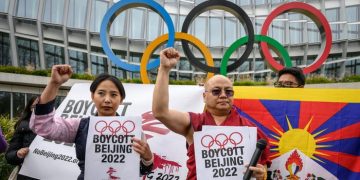
It’s no doubt that the Winter Olympics have been a highly anticipated occasion for sports-lovers worldwide, especially as COVID-19 has ravaged any major event in the past years. Yet, the upcoming one located in Beijing has stirred up much controversy. In fact, many have already taken significant action to boycott the 2022 Beijing Winter Olympics.
Over 180 human rights organizations have been devotedly promoting the boycott, pressuring governments and international teams to not participate or attend. As such, countries such as the UK, US, Canada, and Australia have agreed to this diplomatic boycott by restricting their government officials from attending the games.
However, their teams will continue to play at the Winter Olympics. Still, this boycott act to not send official delegation marks a clear statement: disapproval of the alleged human rights abuses in China, from the democratic crackdown in Hong Kong to the repression of Uyghurs and Muslim minorities in Xinjiang.
A junior at AISG, Sharon C., said that she hoped “this [boycott movement] won’t stop the players from attending as well” and that “the games will happen with or without the government officials attending.”
The boycott began months prior to the games, it reached a new climax when Peng Shuai, a Chinese tennis player, accused a top government official of sexual assault. This issue has created tension for the International Olympic Committee, which has been condemned for failing to act and choosing to remain neutral.
In response to the allegations and boycott movement, China released its own statement.
“To sabotage the preparation and holding of the Beijing Winter Olympics by playing the human rights card out of ideological and political prejudice”, said Zhao Lijian, the spokesperson for the Ministry of Foreign Affairs. Furthermore, he called the American government and human rights organizations’ remarks “shameless lies and disinformation.”
A senior at AISG, Vikisha G., commented on the controversial topic. “It’s reasonable for the human rights organizations and protestors to want to boycott,” she said.
All in all, this debate is essential to understand the role that politics and human rights play in seemingly impartial areas such as sports.